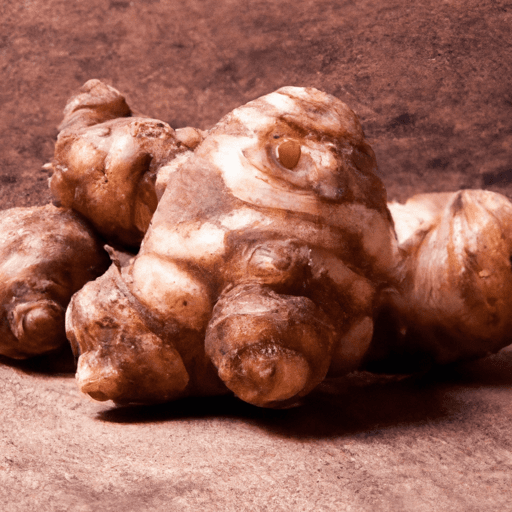The Versatile and Nutritious Jerusalem Artichoke: A Hidden Gem in the Culinary World
If you’ve ever come across a gnarly root vegetable resembling ginger or a potato, there’s a good chance you stumbled upon the Jerusalem artichoke. Despite its name, it neither hails from Jerusalem nor is it an artichoke. Its origin is believed to be North America, where it was cultivated by Native Americans long before European settlers arrived. Wanna know more? Let’s dig in!
Taste and Common Uses
The Jerusalem artichoke, also known as sunchoke, possesses a unique flavor profile. When cooked, it offers a pleasant nutty and slightly sweet taste, reminiscent of artichokes and roasted chestnuts. This delicate flavor makes it a versatile ingredient to experiment with in various recipes.
In the culinary world, Jerusalem artichokes can be enjoyed in countless ways. They can be sliced and enjoyed raw in salads, adding a crisp texture and mild earthy flavor. Roasting or sautéing them brings out their natural sweetness and enhances their nutty undertones, turning them into a delightful side dish or a beautiful addition to a savory medley. A velvety and aromatic Jerusalem artichoke soup also showcases their unique flavor. Additionally, they can be pureed to create a silky dip or incorporated into casseroles, stews, and gratins, lending a distinct taste to the dish.
Nutritional Value
Beyond satisfying our taste buds, Jerusalem artichokes also bring a range of nutritional benefits to the table. These root vegetables are low in calories and fat, making them an excellent addition to a balanced diet. They are particularly rich in dietary fiber, which promotes healthy digestion and helps regulate blood sugar levels. Additionally, Jerusalem artichokes contain noteworthy amounts of iron, potassium, and vitamin C, contributing to improved energy levels and immune function.
Interesting History and Facts
While it is not entirely clear how the name Jerusalem artichoke came to be, some suggest that it may have developed from the Italian word “girasole,” meaning “sunflower.” The name “girasole” was later corrupted to “Jerusalem” by English speakers. As for the “artichoke” part, it refers to the somewhat comparable taste to the prized artichoke vegetable, with a touch of sweetness.
Jerusalem artichokes were introduced to Europe in the 17th century and became popular due to their ease of cultivation. They were especially cherished in France, where they were considered a delicacy fit for royal tables. During World War II, these wonder tubers gained popularity once again, as they provided a reliable food source in times of scarcity.
Jerusalem artichokes, with their unique taste and culinary versatility, are undoubtedly a hidden gem in the world of cooking. Whether enjoyed raw, roasted, sautéed, or pureed, they offer a delightful and nutritious addition to a wide range of recipes. So, why not embark on a culinary adventure and explore the flavors of this intriguing root vegetable? Your taste buds will thank you!
Jerusalem Artichokes
Origin: Jerusalem artichokes, also known as sunchokes, are not actually artichokes, nor are they from Jerusalem. They are native to North America, specifically the eastern part of the United States and eastern Canada. Indigenous tribes like the Native American members of the Pawnee and Dakota nations were the first to cultivate and consume them.
Common Uses: Jerusalem artichokes have a unique nutty and slightly sweet flavor. They can be eaten raw, but are more commonly cooked before consumption. They can be boiled, roasted, mashed, or used in soups and stews. They are also sometimes used to make flour or fermented to produce alcohol, such as vodka.
Nutritional Benefits: Jerusalem artichokes are a good source of fiber, vitamin C, potassium, and iron. They are also low in calories and fat. Additionally, they contain inulin, a type of dietary fiber that acts as a prebiotic and helps promote the growth of beneficial gut bacteria.
Unique Properties: One of the unique properties of Jerusalem artichokes is their high content of inulin, a carbohydrate that is not easily broken down by the body. This makes them a suitable food for people with diabetes, as inulin does not significantly impact blood sugar levels. Additionally, Jerusalem artichokes are known for their knobby, irregular shape and their thin, brownish skin.
Historical Significance: Jerusalem artichokes were an important food source for Native American tribes in North America before European colonization. The French explorer Samuel de Champlain encountered them during his travels in the early 17th century and sent some back to France, where they gained popularity. They were initially believed to have come from Jerusalem, hence their name. Today, Jerusalem artichokes are still enjoyed as a unique and nutritious ingredient in various cuisines around the world.




Use the share button below if you liked it.
It makes me smile, when I see it.